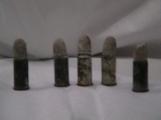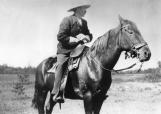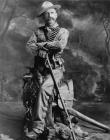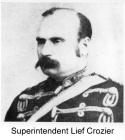1
French settlers.9 December 2003
Located on the Hardware store on Front Street in Duck Lake, Saskatchewan, Canada.
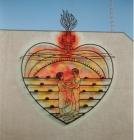
2
"Courage" The settlers came to this land with few possessions but driven by the belief that through hardwork they would make a living off the land and life would be better for their children. This mural portrays the significance of the French speaking settlers to the Duck Lake region. The settlers are depicted in traditional dress and seem to be one with the earth, with the river flowing by in the forground.This mural was created by Joe Fafard who lives and works in Regina, Saskatchewan, Canada.
The settlers were unaware of the difficulties of getting their land claims. Several local settlers voiced their grievances to Riel and supported his efforts. However, new eastern and European settlers favored Canadian law and often were given breaks over the local settlers.
3
Letter from Sgt. John Stewart to the Honorable E. Dewdney.22 March 1885
Duck Lake Regional Interpretive Centre Duck Lake, Saskatchewan, Canada
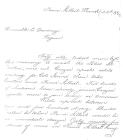
4
The conclusion to the letter written by Sgt. John Stewart to the Honorable E. Dewdney.22 March 1885
Duck Lake Regional Interpretive Centre Duck Lake, Saskatchewan, Canada
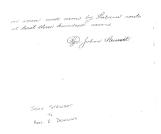
6
Gentleman Joe" McKay, special constable of the N.W.M.P., is the man who was the center of the dramatic scene which immediately preceded the outbreak of the first open hostilities between the rebels and loyalists half a century ago. His version of the event is as follows:"Scouts, who were riding a short distance ahead," he recounts in describing his experiences, "came galloping back as we neared Duck Lake. They brought news that in a saucer-like depression beyond there was a large force of rebels.
Just as they were giving us the information , we noted that a number of rebels raced for a small cabin nearby which offered shelter, but at the same time gave them an unobstructed view of the government forces. It was their deadly fire which was later contributed to the heavy toll taken of our men.
Sergeant Brooks and I ordered to accompany him, Major Crozier walked to the edge of the depression and I was told to signal two Indians that were advancing toward us that we wanted to parley with them.
As I was trying to tell the Indians we wanted to talk with them, one of them commenced to grapple with me for possession of my rifle.
The other Indian, pulling away, dropped to his knee, covering me with his gun. I couldn't make headway in an attempt to parley with them. Then Major Crozier sent Brooks back with orders for the police and volunteers to prepare as it looked as if trouble was in the offing.
When it appeared that the Indians wouldn't parley, Major Crozier turned, as if to return to his men, and the Indian who had been grappling with me, caught Crozier by the shoulder. The policeman continued toward his force, which had taken what cover was available behind the sleighs. The Indian, who had been grappling with me for possession of my rifle, renewed his attempts.
All this happened in much shorter time then it requires to tell it. There I was, in full view of the rebels, grappling with one Indian, and covered by the other, but I kept one Indian between me and the other one.
When Major Crozier ordered us to fire, I whipped out my pistol, shooting the Indian who had been covering me, and then the other one, and the battle had started. The shots I fired were the first in the rebellion to inflict wounds."
"Gentleman Joe" McKay
9
Colonel Irvine, Commissioner of the N.W.M.P. received this report from Superintendent Crozier regarding the Battle at Duck Lake:Prince Albert
April 22, 1885
Sir:
In reply to your memorandum of this date. I have the honor to inform you that on the morning of the 26th of March I sent a party to Duck Lake to procure a quantity of provision and ammunitions that were in the store of a trader named Mitchell. They left Carlton shortly after daylight- about ten o'clock it was reported to me that Sergeant Stewart had been prevented by Half Breeds from taking the stores, after which he had gone away and that he was "in trouble."
I immediately got ready a party one hundred strong to proceed to the relief of Stewart- as I was running off, Stewart's party came down the hill at the Fort. I was informed that there were about one hundred marauding Half Breeds at Duck Lake. The rebel Headquarters and office according to my latest information received through scouts being at Batoche's Crossing, south side of the river. - Verified and concluded to go to Duck Lake and get the provision and ammunition.
When within a mile and a half of Mitchell's store, I was attacked by a Force of Half Breeds estimated at the time at over two hundred in number but I have since been informed through rebel sources that there were at least three hundred and fifty of them.
I threw a line of skirmishes to the right of the road under cover of a wood to prevent the rebels surrounding us which they were attempting to do - the remainder of my force expecting the men in charge of horses formed under cover of the sleighs extended to the left at right angles to the road.
On my escort halting, a man advanced from the enemy bearing a flag of truce. I ran forward to meet him and called back for the Interpreter Joseph McKay.
The enemy, not withstanding the flag truce, continued to get rapidly into position. The movement that threatened to be the most serious to us was that of a large body moving towards our right flank.
I said several times to the man with the flag "Call back those people" referring to those moving to the right - to what I said, he paid not the slightest attention - It was considered that the sending out of the flag of truce was but a piece of treachery used to gain time in order to out flank us on the right and get into position.
Had they accomplished their purpose we must have been annihilated - I considered that the line extended to our right prevented the rebels surrounding us, these men sustained the heaviest loss, because concealed from view to the right of the trail on which we approached were two houses in which were posted a large number of rebels and from whence they poured upon us a fierce fire - from this point they tried to gain and were working upon our right rear, the deep crusted snow however impeded their movements thereby preventing them accomplishing their purpose before the termination of the engagement.
The deep crusted snow caused any movement to be most difficult if off the beaten track, my men in extending found it slow and hard work.
The engagement lasted about thirty minutes and though the rebels were upon their own ground, entrenched in ambush with the advantage of a commanding position, ready and waiting for us, we drove back their right and had we been opposed by them on our right on anything like an equality we could have done the same to their left - but there we had to contend against the enemy in houses and in ambush. The right of my line did prevent the rebels gaining our rear - they did it at the cost of their lives - we could do no more.
Both the Police and Volunteers who composed my little escort behaved superbly - their bravery and coolness under a murderous fire was simply astonishing.
The enemy were in ambush or behind splendid cover - we were exposed, yet not a man shirked or even faltered until the order was given to retire and then they moved off quietly.
Colonel Irvine
Commissioner Carlton N.W.M.P.
I have the honor to be
Sir:
your obedient servant
L.N.F. Crozier
10
Commissioner Irvine brought reinforcements to help Superintendent Crozier in the Battle of Duck Lake1890
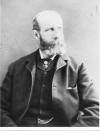
11
Photo of a NWMP horse hoof.1885
Duck Lake Regional Interpretive Centre Duck Lake, Saskatchewan, Canada
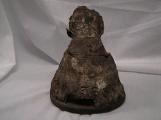
12
Close up of the identification number engraved on the NWMP horse hoof.1885
Duck Lake Regional Interpretive Centre Duck Lake, Saskatchewan, Canada
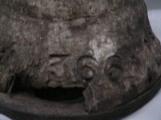
13
Here is the battlefield in Duck Lake. Note the cart paths.1885
The battle scene took place north of Duck Lake
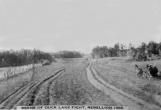
14
Bullets found at the site of the Battle of Duck Lake.1885
Duck Lake Regional Interpretive Centre Duck Lake, Saskatchewan, Canada
